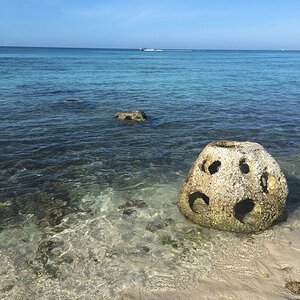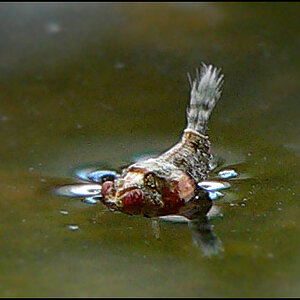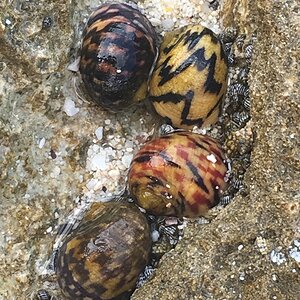JG_Coleman
No longer a newbie, moving up!
- Joined
- May 30, 2010
- Messages
- 336
- Reaction score
- 28
- Location
- Wolcott, Connecticut, USA
- Website
- www.jgcoleman.com
- Can others edit my Photos
- Photos NOT OK to edit
Well, the filters that you need will of course depend upon the type of shooting you usually do. I usually do outdoor photography, so my two cents relates to that type of shooting.
I routinely use a Circular Polarizer... wouldn't ever be without, really. Indoor shooters probably have no use for them, at all... especially considering that they rob a stop or two of light. But for outdoor photography they are really useful tools allowing you: control over glare from water or wet surfaces, deepen sky colors without making clouds look funny, and add a bit of saturation to foliage. It can even help to slow shutter speed a bit when photographing flowing water on rivers or waterfalls (doubling as a glare reducer and mild ND filter).
I also always carry a set of Cokin ND Graduated Filters when I'm doing any landscape photography. They are really indispensable tools for balancing light in a variety of scenes. Some people say Grad NDs are next to useless and only for shots in which there is a perfectly straight horizon... but I can only guess that they've never used "soft graduated" filters, which are much more versatile.
I also carry ND filters, but you've mentioned that you already have one of those.
I also carry some Nikon Close-Up filters, but these rarely get much use since the quality of the photos they produce isn't really anything to write home about. Also, in the case that you have a dedicated macro lens, these are truly pointless.
I have never used UV/Haze filters for a couple of reasons. First of all, I've carried my camera over mountains, across salt flats to islands, through forests, up rocky river gorges, through salt marshes, meadows, in the rain, sleet, snow and ice, across a half-dozen states, for probably a couple hundred miles. I have never been so careless as to smash my camera or lens in any way, nor has it ever collected so much dust and debris that I couldn't easily and harmelessly clean it off with a lens wipe every now and then. Now, don't get me wrong... mistakes do happen... and, like most on this board, if I broke my lens it would take me months to buy a replacement... I don't have a whole lot of cash laying around. But most of what a UV filter affords is just psychological protection... in most cases, people are already careful enough just knowing that they are carrying around a camera worth hunderds or even thousands of dollars.
However, the fact that I am routinely using polarizers, grad NDs, and ND filters means that UV filters are truly impractical for me, as I can't be constantly removing a comparatively useless UV filter all the time. it's just not worth the hassle.
I have also done tests with a UV filter to see if they even actually do anything. Now my tests weren't scientific, I admit... but I've concluded, for my own part, that they are truly pointless as far as having any real photographic effect with digital cameras. I still try it out from time to time in different situations, waiting to hit upon some instance where they actually do anything... I have yet to find any scenario that fits the bill.
My suggestion... just use a lens cap to protect your lens. They pop off SOOO quick, they don't have to be carefully unscrewed every time you want to use a screw-on filter that has an actual purpose, and are many times more durable than UV filters. A lens cap should pretty much last a lifetime.
I routinely use a Circular Polarizer... wouldn't ever be without, really. Indoor shooters probably have no use for them, at all... especially considering that they rob a stop or two of light. But for outdoor photography they are really useful tools allowing you: control over glare from water or wet surfaces, deepen sky colors without making clouds look funny, and add a bit of saturation to foliage. It can even help to slow shutter speed a bit when photographing flowing water on rivers or waterfalls (doubling as a glare reducer and mild ND filter).
I also always carry a set of Cokin ND Graduated Filters when I'm doing any landscape photography. They are really indispensable tools for balancing light in a variety of scenes. Some people say Grad NDs are next to useless and only for shots in which there is a perfectly straight horizon... but I can only guess that they've never used "soft graduated" filters, which are much more versatile.
I also carry ND filters, but you've mentioned that you already have one of those.
I also carry some Nikon Close-Up filters, but these rarely get much use since the quality of the photos they produce isn't really anything to write home about. Also, in the case that you have a dedicated macro lens, these are truly pointless.
I have never used UV/Haze filters for a couple of reasons. First of all, I've carried my camera over mountains, across salt flats to islands, through forests, up rocky river gorges, through salt marshes, meadows, in the rain, sleet, snow and ice, across a half-dozen states, for probably a couple hundred miles. I have never been so careless as to smash my camera or lens in any way, nor has it ever collected so much dust and debris that I couldn't easily and harmelessly clean it off with a lens wipe every now and then. Now, don't get me wrong... mistakes do happen... and, like most on this board, if I broke my lens it would take me months to buy a replacement... I don't have a whole lot of cash laying around. But most of what a UV filter affords is just psychological protection... in most cases, people are already careful enough just knowing that they are carrying around a camera worth hunderds or even thousands of dollars.
However, the fact that I am routinely using polarizers, grad NDs, and ND filters means that UV filters are truly impractical for me, as I can't be constantly removing a comparatively useless UV filter all the time. it's just not worth the hassle.
I have also done tests with a UV filter to see if they even actually do anything. Now my tests weren't scientific, I admit... but I've concluded, for my own part, that they are truly pointless as far as having any real photographic effect with digital cameras. I still try it out from time to time in different situations, waiting to hit upon some instance where they actually do anything... I have yet to find any scenario that fits the bill.
My suggestion... just use a lens cap to protect your lens. They pop off SOOO quick, they don't have to be carefully unscrewed every time you want to use a screw-on filter that has an actual purpose, and are many times more durable than UV filters. A lens cap should pretty much last a lifetime.
Last edited:





![[No title]](/data/xfmg/thumbnail/40/40309-c759bfd4ae7c079632e7402d21d332f1.jpg?1619739414)
![[No title]](/data/xfmg/thumbnail/40/40311-715dda8167abb793178d6abf7e8136fe.jpg?1619739414)
![[No title]](/data/xfmg/thumbnail/42/42479-eb9612f7aa37a41755b9e23b5739a3bf.jpg?1619740195)
![[No title]](/data/xfmg/thumbnail/36/36662-242aa39f5cb3a23494857864779f669b.jpg?1619737675)

![[No title]](/data/xfmg/thumbnail/36/36658-525087f40e1bdbfe8b995ce4296ef4a6.jpg?1619737675)


